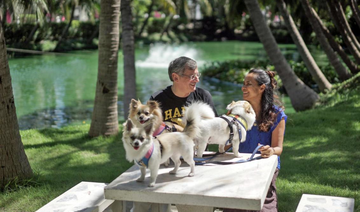BANGKOK: Six years ago, Somsak “Pai” Boonkam drew up a plan with two villages in northern Thailand for tourists to stay with local families and immerse themselves in hill-tribe culture. The aim was for the villagers to see some financial benefit from their country’s multi-billion-dollar tourism industry.
Pai was sure it would be a hit with tour operators in Bangkok — but he was wrong. “They weren’t even interested to go and inspect the places,” he said.
That pushed the former engineer, now 34, to set up Local Alike, a travel consultancy that promotes sustainable tourism in 70 villages.
“I grew up in the same situation where there weren’t many economic opportunities, so it attracts me to work for the people,” said Pai, who lived with his grandparents in a village in northeast Thailand until he was eight while his parents traveled in search of laboring work.
A growing number of young Thai entrepreneurs like Pai are getting involved in activities that have traditionally been the domain of the government and development groups — from providing water in remote communities to helping coffee farmers earn a fair income.
This new generation of business owners believes running companies that invest in tackling social and environmental causes is a better way to help than relying on donors’ whims.
“There are so many problems in Thailand that need to be solved,” said Pai. “I see (this as) the new pattern of doing business — doing good while making money.”
Half of Local Alike’s business units are now financially sustainable and it runs a development fund that supports local projects, he said.
Thailand’s transformation to an upper-middle-income country in less than a generation has lifted millions out of poverty, but inequality and deprivation persist.
Over 80 percent of Thailand’s 7.1 million poor people live in rural areas, and an additional 6.7 million are just above the poverty line, according to the World Bank.
The Southeast Asian nation of 66 million also faces serious challenges of environmental degradation and resource depletion caused by mass tourism, pollution, generation of waste and intensive farming, experts say.
Aliza Napartivaumnuay, 34, grew up in Kolkata, Rome and Seattle before moving back to Bangkok. She spent nearly a decade working in the retail supply chain before co-founding Socialgiver more than two years ago.
The online business offers deals on leisure services, including hotel rooms, restaurant tables and spa packages. The proceeds fund social and green projects, such as reforestation, children’s education and hospital beds for poor patients.
The idea was not to set up a business that spoke only to people who already care about such issues.
“We wanted to create something more inclusive and approachable by offering services users are accustomed to spending on,” said Aliza.
Many trace the birth of social enterprise in Thailand to the establishment in 1974 of Cabbages and Condoms, a successful Bangkok restaurant that funds sexual health education and provision.
But the concept only started gathering pace a few years ago, with incubators such as Change Fusion fostering start-ups.
Now there are businesses that enable blind children to learn using a special drawing board, or that train and employ people with disabilities. Others support widows and orphans affected by the conflict in southern Thailand, and use IT to help health professionals and charities develop mobile apps.
There are between 5,000 and 10,000 organizations in Thailand that fit the social enterprise model, said Nuttaphong Jaruwannaphong, director of the Thai Social Enterprise Office (TSEO).
Saks Rouypirom, 39, opened Broccoli Revolution, a trendy restaurant serving vegan, mostly organic food to help fund his non-profit Sati. Its projects include installing water filters in northern villages in partnership with US-based Planet Water Foundation.
“Sati means ‘mindfulness’ so it’s about being mindful of problems and solutions,” said Saks, who buys mushrooms for his restaurant from a street-child shelter and kale from farmers to whom he has provided the seeds.
“Being a business owner, you can make a conscious decision to support these causes,” added Saks, who was born and raised in the United States.
Still, for all the excitement about their potential, social enterprises face multiple challenges in Thailand, including a lack of regulation and limited access to finance.
It was “very difficult” to get investors on board to set up Local Alike, when they were told they would not see all the profits, said Pai. He received support from Change Fusion and entered business competitions to win funding.
In Thailand, companies seeking certification as social enterprises cannot pay more than 30 percent of their profits in the form of shareholder dividends, said TSEO’s Nuttaphong.
When Ayu “Lee” Chuepa wanted to help coffee farmers in his community earn a fair income, he had a hard time convincing villagers to work with him due to his youth and inexperience.
“My mother said that is to be expected. So I asked, ‘If you weren’t my parents, would you have joined me?’. They said, ‘Of course not. Are you crazy?’” he recounted, laughing.
Things have since improved. The Stock Exchange of Thailand, for example, now has an online platform that promotes investment in social enterprises.
But the public perception that such businesses offer lower-quality products still needs to be tackled, experts say.
“Since the beginning, I didn’t want to sell our products by making people feel pity. I want them to buy because they’re good,” said Lee, who belongs to the Akha ethnic minority.
He is now building his third branch of Akha Ama Coffee, with help from architects at Jai Baan Studio, another social enterprise that uses local resources and nature in its designs.
Lee hopes the division between social and traditional businesses will fade with time. “I want everyone in the world to be a social entrepreneur, doing good,” he said.
From tourism to coffee, young Thai entrepreneurs blend profit with social good
From tourism to coffee, young Thai entrepreneurs blend profit with social good

Cambodia takes back looted historic artifacts handled by British art dealer

- The objects were returned under a 2020 agreement between the Ministry of Culture and Fine Arts and the family of the late Douglas Latchford, a British art collector and dealer who allegedly had the items smuggled out of Cambodia
PHNOM PENH, Cambodia: Cambodian officials on Friday received more than six dozen historic artifacts described as part of the country’s cultural heritage that had been looted during decades of war and instability.
At a ceremony attended by Deputy Prime Minister Hun Many, the 74 items were unveiled at the National Museum in Phnom Penh after their repatriation from the United Kingdom.
The objects were returned under a 2020 agreement between the Ministry of Culture and Fine Arts and the family of the late Douglas Latchford, a British art collector and dealer who allegedly had the items smuggled out of Cambodia.
“This substantial restitution represents one of the most important returns of Khmer cultural heritage in recent years, following major repatriations in 2021 and 2023 from the same collection,” the Culture Ministry said in a statement. “It marks a significant step forward in Cambodia’s continued efforts to recover, preserve, and restore its ancestral legacy for future generations.”
The artifacts were described as dating from the pre-Angkorian period through the height of the Angkor Empire, including “monumental sandstone sculptures, refined bronze works, and significant ritual objects.” The Angkor Empire, which extended from the ninth to the 15th century, is best known for the Angkor Wat archaeological site, the nation’s biggest tourist attraction.
Latchford was a prominent antiquities dealer who allegedly orchestrated an operation to sell looted Cambodian sculptures on the international market.
From 1970 to the 1980s, during Cambodia’s civil wars and the communist Khmer Rouge ‘s brutal reign, organized looting networks sent artifacts to Latchford, who then sold them to Western collectors, dealers, and institutions. These pieces were often physically damaged, having been pried off temple walls or other structures by the looters.
Latchford was indicted in a New York federal court in 2019 on charges including wire fraud and conspiracy. He died in 2020, aged 88, before he could be extradited to face charges.
Cambodia, like neighboring Thailand, has benefited from a trend in recent decades involving the repatriation of art and archaeological treasures. These include ancient Asian artworks as well as pieces lost or stolen during turmoil in places such as Syria, Iraq and Nazi-occupied Europe. New York’s Metropolitan Museum of Art is one of the prominent institutions that has been returning illegally smuggled art, including to Cambodia.
“The ancient artifacts created and preserved by our ancestors are now being returned to Cambodia, bringing warmth and joy, following the country’s return to peace,” said Hun Many, who is the younger brother of Prime Minister Hun Manet.














